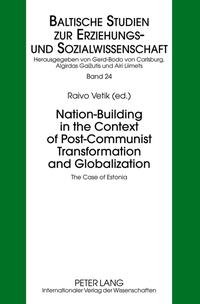
This volume is devoted to the relationship between political and social dimensions of nation-building in Estonia. The authors of the volume analyse the Estonian nation-building since 1991, when the Soviet Union collapsed and Estonia regained independence, in the context of post-communist transformation and globalization. Such a double macro-historical change has brought about highly polarized views in society between the ethnic Estonian and Russian-speaking communities on a number of key aspects of nationbuilding, like ethnic policy, meaning of national integration etc. The volume argues that national integration can progress only via formation of a unifying citizen identity in Estonia, embedded within democratic political processes.